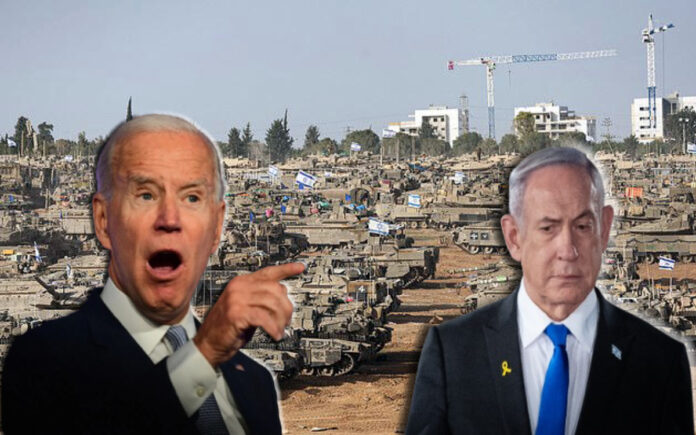Tel Aviv: Benjamin Netanyahu has emphatically rebuffed Biden’s proposals for a post-war settlement in Gaza, asserting that “there is no alternative to military victory” until Hamas is decisively vanquished.
In a video released by his office on Wednesday, the seasoned Israeli Prime Minister argued, “The attempt to bypass it with this or that claim is simply detached from reality.”
As IDF troops inch closer to a potential full-scale invasion of Rafah and with 600,000 residents displaced from the southern city in just 10 days, both allies and critics of Israel intensify pressure to find a viable solution. Talks in Cairo earlier this month failed to yield any resolution, heightening the urgency of the situation.
The United States, while urging Israel to refrain from obliterating Hamas without a comprehensive exit strategy, warns of the potential consequences. There are concerns that the region might plunge into a power vacuum akin to post-invasion Iraq, fostering resentment and providing fertile ground for terrorism to thrive.
However, these apprehensions haven’t halted the Biden administration from advancing a $1 billion weapons package for Israel, a move confirmed to Congress on Tuesday. Biden assured that further munitions would be withheld should Israel proceed with a full-scale invasion of Rafah.
As the war enters its seventh month, observers and mediators caution that without peace terms hashed out with Hamas and a practical exit strategy, Israel risks allowing violent anti-Zionist factions to emerge, garnering support from disaffected groups.
National Security Advisor Jake Sullivan emphasized on Monday the need for Israel’s military efforts against Hamas to be accompanied by a long-term political plan aimed at replacing the group. “How do we get to the common goal, the enduring defeat of Hamas? And that is going to require military pressure, yes. But more than just military pressure—a political plan to get there,” he told reporters at the White House.
Secretary of State Anthony Blinken echoed similar sentiments on NBC’s “Meet the Press”, stating, “Israel’s on the trajectory potentially to inherit an insurgency with many armed Hamas left or, if it leaves, a vacuum filled by chaos, filled by anarchy, and probably refilled by Hamas.”
These views align with analysis from the Israel American think tank The Washington Institute, which warned as early as November that Israel’s failure to offer Palestinians a viable alternative to Hamas could exacerbate tensions and undermine regional security.
“Criminal mobs, the rise of warlords or dominance of powerful clans, poverty, famine, diseases, the radicalisation of a resentful and beaten population… would present enormous security, geopolitical, humanitarian, and international challenges. As such, rebuilding an administrative infrastructure for Gaza should be an immediate priority.”
Both Israel and Hamas continue to trade blame for the deadlock in peace talks. After Hamas’ deadly attack on October 7, Israel vowed to return hostages taken back into Gaza and ensure the total defeat of Hamas, two objectives deemed essential for the campaign’s success.
Also Read | President Biden Responds to Trump’s Debate Challenge
Hamas, on its part, has linked the return of hostages to the end of the war, creating a stalemate. Netanyahu reiterated earlier this month, “While Israel has shown willingness, Hamas remains entrenched in its extreme positions, first among them the demand to remove all our forces from the Gaza Strip, end the war, and leave Hamas in power. Israel cannot accept that.”
Israel has persisted with its strategy in Rafah, even as the majority of Gaza’s population remains displaced. With over 90% of its 2.3 million residents displaced by the start of the year, aid groups warn of a deteriorating humanitarian situation without a prompt resolution to the conflict.
Despite the threats of repercussions, the United States proceeded with plans to send $1 billion in weapons to Israel, albeit pausing a shipment of 2,000-pound bombs due to concerns about their use in densely populated areas.
Also Read | Russian Forces Advance Towards Ukrainian Village Near Kharkiv, Reports RIA
The completion of a temporary pier project off the coast aims to facilitate the delivery of humanitarian aid to Gaza, with the United States finishing construction on Thursday. However, this maritime route, fraught with logistical, weather, and security challenges, is seen as complementary rather than a substitute for land-based deliveries.
U.S. officials emphasize that American troops will not set foot in Gaza but acknowledge the risks of operating near the war zone.



